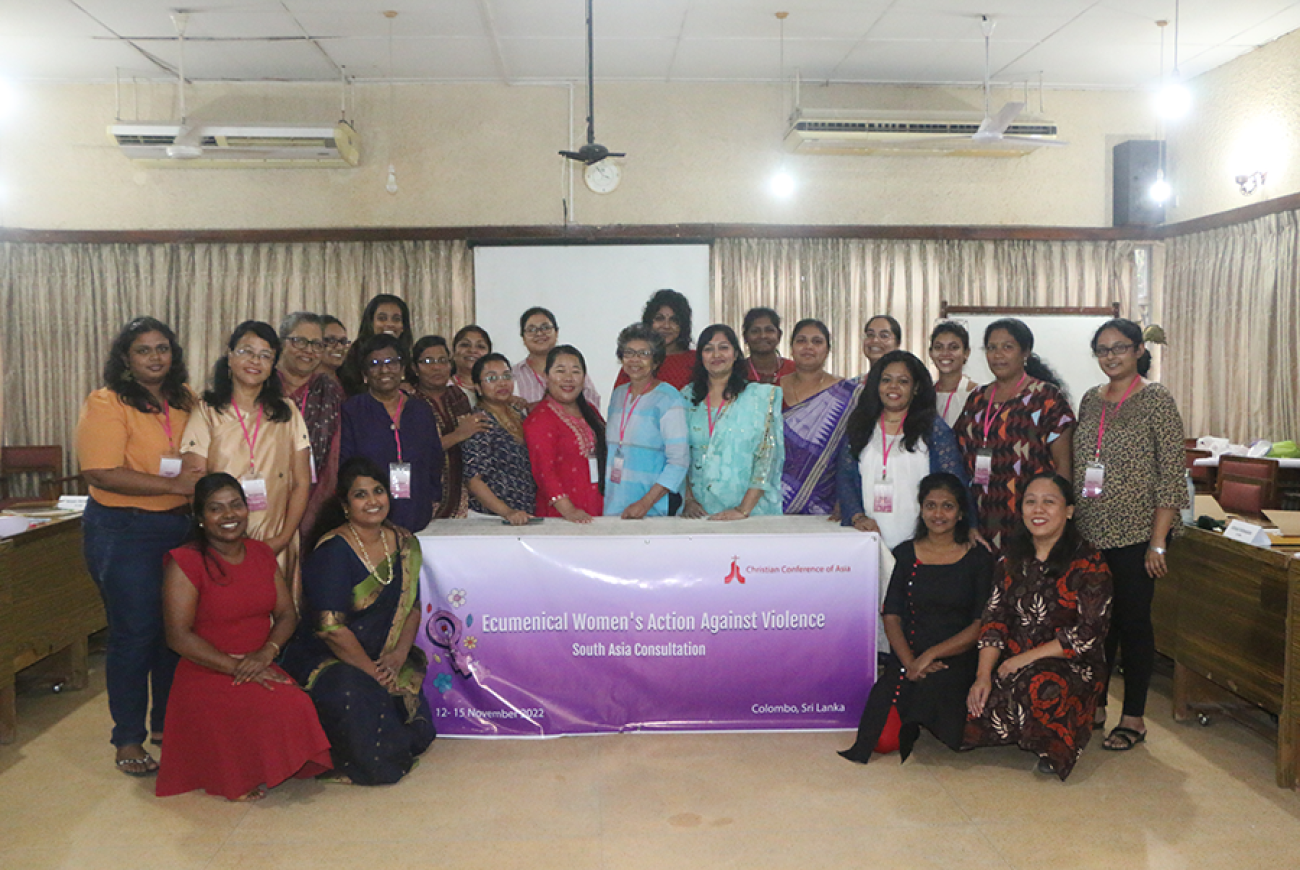South Asia women’s consultation focuses on strengthening ecumenical advocacy on combating violence against women and girls

Ecumenical Women’s Advocacy on Violence Against Women: South Asia Consultation–2022 Participants
A four-day sub-regional consultation organized by the Christian Conference of Asia (CCA) with focus on ecumenical women’s advocacy on violence against women and girls provided rich experiences for participants to understand the current situation in different countries, as opined by the participants, who represented churches and ecumenical councils from Bangladesh, India, Nepal, Pakistan and Sri Lanka. “Most of us felt that we needed to go further with the new ideas gained and plan of actions towards gender justice in order to benefit from the positive energy radiated among us during the consultation, which was a source for us to get rejuvenated within and among ourselves as it brought motivation and hope in our struggles and journey towards the liberation of all kinds," Dr Vedhakani Vedhanayagam, a participant from India, opined towards the end of the consultation. About twenty-five women from South Asian countries attended the consultation as part of CCA’s ongoing advocacy capacity-building programme of the Ecumenical Women’s Action against Violence (EWAAV), which was held at the Ecumenical Institute for Study and Dialogue, Colombo, Sri Lanka, from 11 to 15 November 2022. The Consultation aimed at strengthening the advocacy for women's empowerment and also focused on the collaboration and networking among churches and women's organizations in Asia with a view to combating violence against women. Nimalka Fernando, a woman human rights defender, introduced key issues related to Gender Equality and Challenges in South Asia. Ms. Fernando highlighted the rising religious extremism and illustrated how the situation in each country exacerbates gender-based violence in the region. She also stressed that women must continue to be engaged in the campaign for women’s liberation even in the midst of the prevailing oppressive systems. Shreen Abdul Saroor from the Women’s Action Network (WAN) in Sri Lanka shared the importance of intersectionality in understanding violence against women and girls. She brought up the issues with the religious and cultural gender frameworks and patriarchal theologies of all religions and challenged the participants to revisit their theological understandings in order to quicken the journey toward gender justice. Nelun Gunasekara, a Gender Consultant, facilitated a workshop on ‘Gender Justice as Fundamental to Human Rights’. She led the group in discussing gender justice issues faced by women in their respective countries. Esther Hoole from the UN Women facilitated discussions on Gender Equality and the role of churches and faith communities in contributing towards attainment of the goals of overcoming gender-based discrimination and of ending violence against women. Attorney Vijula Arulanantham from the Church of Ceylon presented the International and Regional Mechanism for Women’s Rights. Ms. Arulanantham emphasized salient features of the Convention on the Elimination of All Forms of Discrimination Against Women (CEDAW) which is seen as a mechanism for strengthening the advocacy for women's rights. She suggested possible advocacy outlines from the contextual backgrounds of countries in South Asia. Dr Vethakani Vedhanayagam a theological educator from the Church of South India and Rev. Romella Robinson, an ordained minister from the Presbyterian Church of Pakistan facilitated Contextual Bible Study sessions, and they made attempts to re-read the Biblical stories from the socio-cultural and religious contexts and shared insights about the courage portrayed by several women in the Bible. The Consultation was coordinated and facilitated by staff members from CCA Secretariat Arceli Pepito Bile and Yodinge Kithminee Chamathka Kularatne. The participants worked out advocacy plans for strengthening advocacy initiatives for gender justice and for combating violence against women. More photos can be found here.











